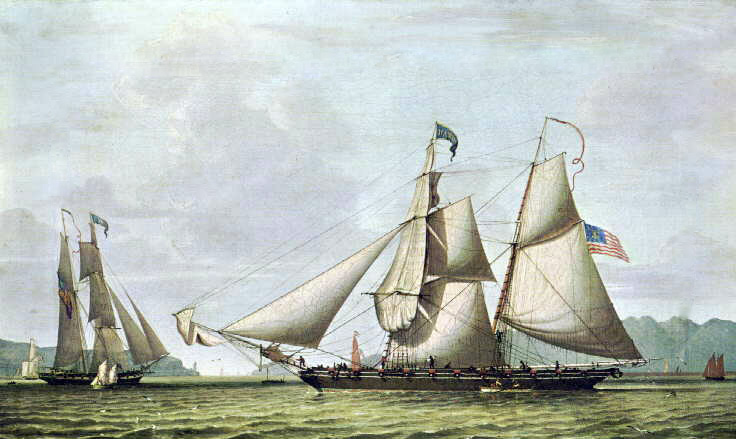During the late war between the United States and Great Britain, among the privateers fitted out in the city of New-York, was the Yorktown, commanded by Captain Riker, a native of Newtown, Long-Island, where many of her crew, some of whom were farmers’ sons, belonged; and among them was a tall stripling of a youngster, by the name of Botterfolk. He was a tall, uncouth looking lad, with a countenance full of good nature, and extremely awkward in his gait and whole deportment. This vessel, after an unsuccessful cruise, was captured.
A day or two after the capture, the prisoners were permitted to visit the deck in squads and remain some time for their health; and one day, the weather being very fair, a squad was summoned for that purpose, among whom was young Botterfolk. They were permitted to chat with one another. They had not been there but a short time, before the attention of the crew, &c, were called, by the appearance of the commander upon deck. He was an aged man, with a fine open countenance, and appeared to walk with pain and some difficulty, and finally hobbled forward to see his American prisoners, accompanied by a fine looking young officer supporting him by one arm, but made no observation until halting at a short distance from the group, where he stood a few moments. He smiled and fixed his eyes on the odd figure of young Botterfolk, when he gazed and turned to the Midshipman, saying, “I will speak to that young man.” When he approached, all eyes were upon him as he said,
“Young man, what part of the United States are you from?”
Our hero, not in the least daunted, promptly replied, “Newtown, sir.”
“Newtown?” said the Commander.
“Yes, sir, Newtown, Long-Island.”
“Near New-York?”
“Yes, sir.”
The odd appearance seemed to have attracted his attention. “Is it a large town?”
“No, sir.”
“Is it famous for anything?” smiling.
“Not much, sir; nothing but pretty gals and pippins;” says the other cheerfully.
The old veteran burst into a laugh, and laying his hand upon his side, said, “Ashburton, lead me to the cabin, and tell the young man to accompany us below” — and the prisoner followed, and was courteously beckoned to a seat, when the following conversation took place:
“So you say your native place is Newtown?”
“Yes, sir.”
“Well, pray tell now if that is near any place called Englishtown, or English Neighborhood?” — a short hesitation. — “Wasn’t it English Kills, sir?”
“Aye, I believe it was.”
“Is there an outlet to Long-Island Sound?”
“Yes, sir.”
“There, Ashburton, is where we wintered in 1780, with the sloops Fox and Weazel, when I was a midshipman, during the rebellion in America.”
“Is it possible?” said the young officer.
“Tell me further; is the Quaker family there yet? I think the name was — hold — was, Way — the same —“
“No, the place where you wintered is now called Mott’s Island.”
“Well, if I ever should visit New-York I will visit that spot.”
“Well, Pa,” said the young man, “that may happen before long. If we should happen to fall in with Hull, Decatur, or any of those fine ships, with this old hulk under us.”
“God forbid,” says the Commander. On this he took from the escritoire two pieces of gold and handed them to the prisoner, saying, “Young man, it is uncertain where we may be obliged to land you; these will assist you on the way to reach your friends.” The prisoner took his hat to depart. “Stay,” says he. “Ashburton call the steward.” And soon a flask of old Jamaica stood before them, after which the prisoner took his leave.



